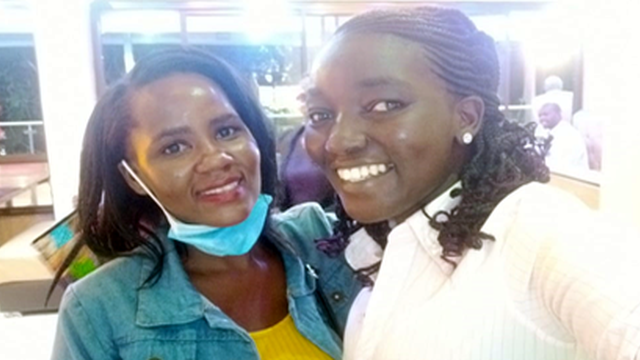
Case study: Hunger for knowledge on sustainable development and food security systems in Africa
I was delighted when I read the story of Ngina from Egerton University Facebook page early January 2021. Ngina is a Knowledge Specialist in Drylands and a BSc. Agribusiness Management graduate from Egerton University. She was sponsored to undertake an Internship Program in Israel at Arava International Center for Agriculture in 2018-2019.
Knowledge acquisition
After she completed her training, Ngina came back to Kenya and went to Turkana County where she volunteered for six months at Furrows in the Desert to share her knowledge she had acquired in Israel on agricultural Artificial Intelligence (AI) and sustainable food security systems such as drip irrigation, constructing furrows, and how to weed crops and fertilise. Israel is advanced on agricultural AI; the farm is connected via mobile phones which can notify you what is happening in the farm and in case the crop has an attack. Farmers are using drip irrigation to ensure that there is no wastage of water.
Local knowledge comes to the rescue of water project in Turkana County
Sammy Lutta who is a journalist at Nation Media shares a story which the Turkana County will incorporate Indigenous knowledge (IK) from villagers to ensure sustainability of food security systems and irrigation projects. This is after the devolved unit established that millions of shillings have been going down the drain due to over reliance on technical expertise. Agriculture executive Philip Aemun said traditional knowledge, especially on landscape, would supplement modern technological designs and ensure sustainability of farms. “Input from locals will be critical in rehabilitating failed irrigation schemes and establishing new ones for long-term crop production,” said Sammy Lutta.
Hunger and thirsty for knowledge
My passion hunger for knowledge management in supporting youth in Africa in addressing food security systems and championing the Big 4 Agenda on food security in Kenya thrilled me to look for Ngina in order to tap her tacit knowledge and bring her on board to be our knowledge champion and share her tacit knowledge with our African youths at Global Knowledge Partnership Network who are farmers. They have never had an opportunity to access existing opportunities in the larger ecosystem because majority of farmers in Africa are in the marginalized rural areas and they don’t have access to such knowledge.
I shared with Ngina about agricultural knowledge networks such as Knowledge Transfer Africa, FAO, WFP, and IFAD Communities of Practice Farmers Organizations for Africa, Caribbean, Pacific –FO4ACP. These communities are open to all farmers but surprisingly majority of our African youth farmers are not aware. ‘‘There are a lot of opportunities but we don’t have the link’’ said Ngina.
Knowledge discovery
My journey for searching an Israeli knowledge champion (Ngina) began on January 27, 2021. I searched Racheal Ngina on Facebook but all in vain, I searched her on LinkedIn and I found Rachael Ngina an Agronomist at Furrows in the Desert – Turkana. I sent her a connection request and an introduction message explaining who I was and how I knew about her through her story Graduate Transforms Turkana Dryland using Israeli Technique.
I waited for her feedback, two weeks later and there was no response. I was yearning more for this tacit knowledge, so I went back to Egerton University Facebook page, send a message via Facebook Messenger requesting on how I can get in touch with Racheal and her lecturer gave me the contacts.
I called Ngina via phone, we talked and organised for our Knowledge Café at Kilima Njaro Restaurant which has become our Knowledge Café Hub in Nairobi for our Kenyan knowledge management professionals in Nairobi where we meet for KM coffees and knowledge sharing.
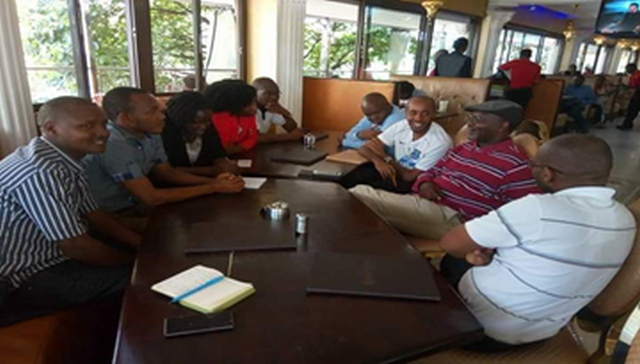
Fostering knowledge sharing
During our Knowledge Café we had a wonderful session sharing about our career journey and passion in building capacity of youth in Africa through mentorship and knowledge exchange programs at Global Knowledge Partnerships Network. I asked Ngina why she chose to volunteer in Turkana and her response was “The media keeps on reporting how people were starving in Turkana why don’t we teach them how to produce their own food.”
She further explained her passion for Turkana is as a result of hunger strike she went through while a kid. According to World Relief, Turkana County is one of the hottest, driest regions in the world where hundreds of thousands of Indigenous people are hungry and at risk of starvation. Turkana faces large-scale famine.

Knowledge transfer: Lodwar women are combating hunger through knowledge application
Ngina shared that Turkana people are not happy when they see their malnutrition photos being used to get food aid but they’re happy when they see photos with green plantation in their farms.
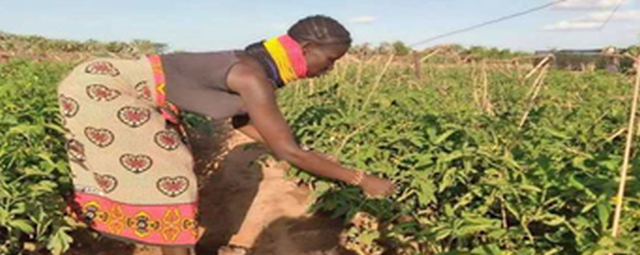
Elizabeth Lokopon is now among 78 farmers at a four-and-half hectares Full Gospel Church of Kenya Natoot Farm Project. Before the project was commissioned in mid-2018 she had never used a jembe or planted any crop.
“I was amused after learning that I had to wait for someone to provide me with free food – mainly maize and beans that can’t last for a month when after free training, I can use my hands to grow enough food for my family and the surplus sold for income,” said Ms Lokopon who also grows collard greens (Sukuma wiki), cowpeas, and spinach.
Knowledge deficiency is affecting Africa’s economy
Ngina narrates there is still a huge knowledge gap among the youth practising agriculture in Kenya thus there is a need of creating a knowledge sharing culture in Africa and beyond. “Many of my trainees had never seen anything growing. It was their first time to see seeds and to plant anything. I am proud that after six months, they have been fully equipped with knowledge on how to grow their own food from a nursery establishment, how to prepare the land, transplanting, pest control, harvesting and post-harvest handling. Today those people in Lobur, Kibish, Lodwar, Maisa, Katangon, Nariakotome and their environs are healthy and happy. Their children have access to fresh fruits, vegetables and cereals.”
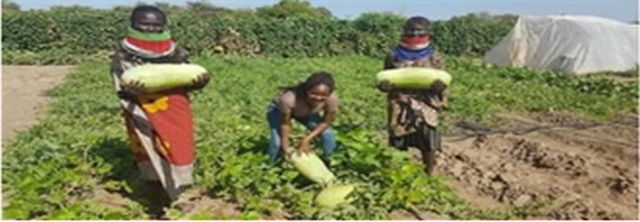
Header image: Ngina (left) and Gladys Kemboi-Mama Africa Knowledge Management (right) (©2021 KM Champion / photo by Gladys Kemboi).


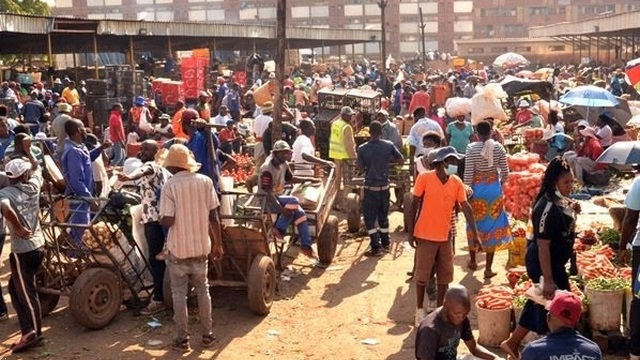
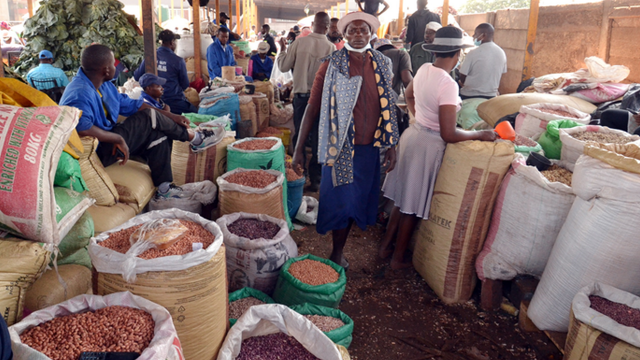
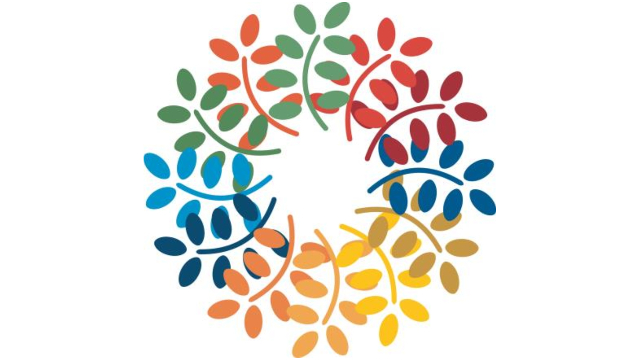
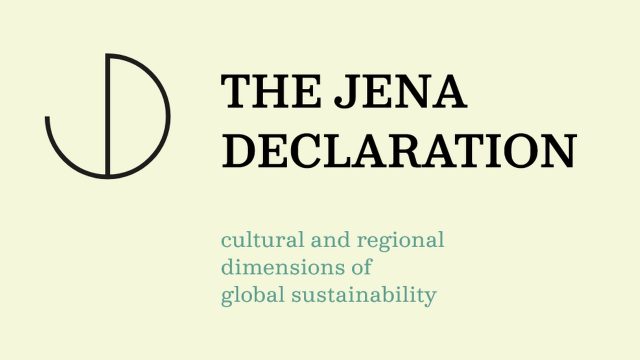

Lol……… awesome!
Congratulations ! Thumbs up